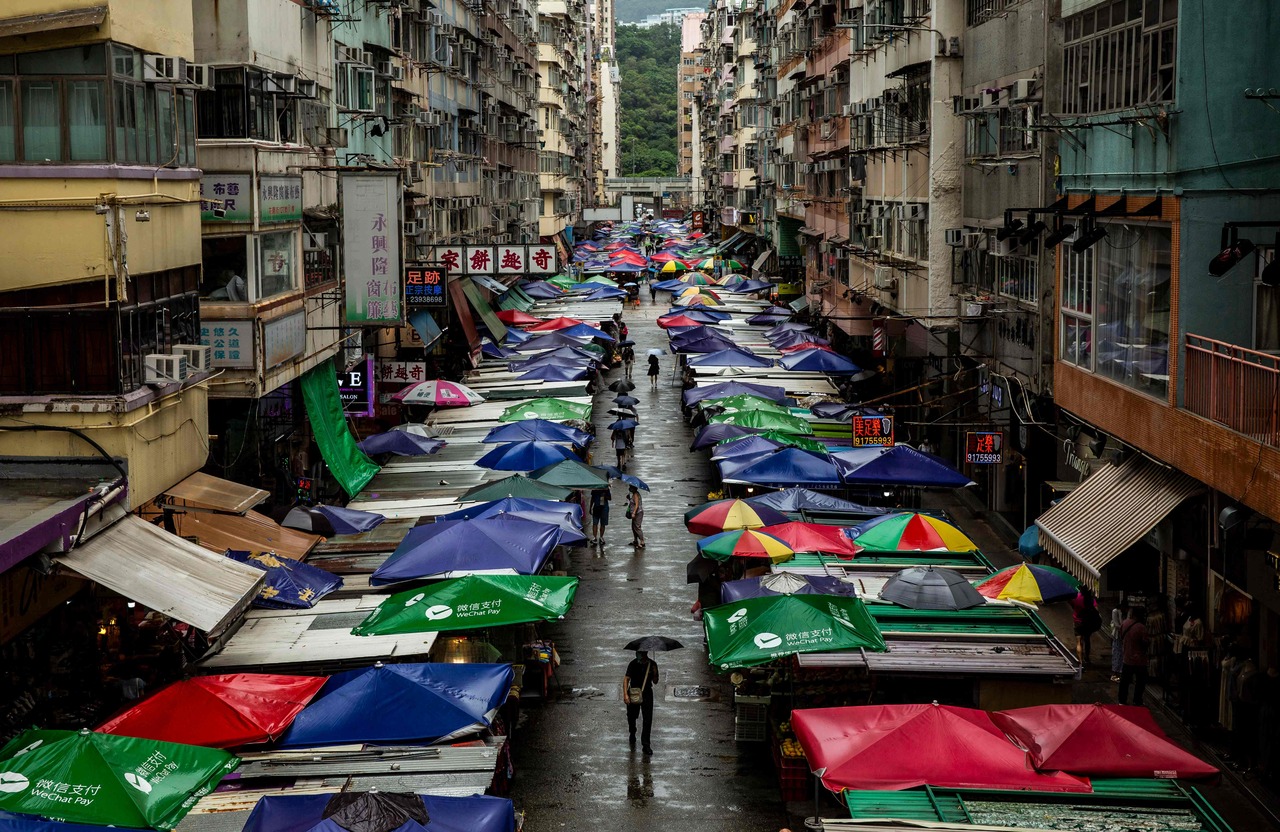Businesses in Hong Kong slam tightened Covid-19 travel curbs
Sign up now: Get ST's newsletters delivered to your inbox

Hong Kong is caught between its desire to reopen and its zero tolerance for any cases of Covid-19.
PHOTO: AFP
Follow topic:
HONG KONG (BLOOMBERG) - Business groups in Hong Kong reacted with dismay after the announcement of tightened travel curbs on Monday (Aug 16) for residents returning from more than a dozen countries, including the United States, France and Spain, less than two months after it started easing some of the world's strictest quarantine measures.
Citing threats from Delta variant resurgences, the city's government said it would move 15 countries to the "high-risk" category, meaning that vaccinated Hong Kong residents returning home must spend 21 days in hotel quarantine upon arrival, triple the previous length of stay. Tourists and unvaccinated residents from those places are no longer allowed entry.
The new restrictions take effect from Aug 20, according to a government statement. Residents and tourists with antibody test results proving they had been vaccinated previously had to spend a week in hotel quarantine.
"The re-opening of Hong Kong has been postponed until further notice," said Mr Frederik Gollob, chairman of the European Chamber of Commerce in Hong Kong.
"There is no reliability whatsoever coming from the Hong Kong government regarding how long new measures can last and what the criteria are to change the quarantine measures and travel arrangements."
Hong Kong is caught between its desire to reopen and its zero tolerance for any cases of Covid-19. Meanwhile, its rival financial hub in Singapore has announced plans to ease coronavirus-related restrictions on daily life and begin slightly loosening border controls, citing vaccination rates that rank among the best in the world.
The flip-flopping creates additional uncertainty and risks further diluting Hong Kong's attractiveness as a business destination. The city implemented new rules to allow visitors from all but 10 places to enter on Aug 9.
"This is a devastating announcement in terms of the inability for businesses to plan," Ms Tara Joseph, president of the American Chamber of Commerce Hong Kong, said in a WhatsApp message. "We respect the worries over the need to keep infections down, but business and people need to connect overseas and plan for the future."
Hong Kong's success with Covid-19 has come through strict mitigation measures, including lengthy hotel quarantines for those newly arriving. Just 39 per cent of its population is fully vaccinated, less than many other developed economies and far below Singapore's rate of 73 per cent.
Mainland China, which is also following a Covid-zero strategy, has committed to tightly sealing its borders to stamp out the virus, risking years of isolation.
Hong Kong's about-turn comes after a resident returning from the US tested positive for the virus several days after completing a seven-day quarantine, sparking fears that the eased travel rules would allow the Delta variant to slip into the Asian financial hub. Hong Kong has enjoyed a streak for over two months with nearly no local virus cases, even as neighbours like Singapore and mainland China struggled to contain the mutation.
"The global Covid-19 epidemic situation is under serious threat from the Delta variant, with acute surges in the number of confirmed cases within a short period of time in many countries," according to the government statement, that added the measures are meant to "uphold the local barrier against the importation of Covid-19".
The government did not explain how it determined which countries to include on its high-risk list, creating more uncertainty for multinational companies affected by the sudden shift in policy.
"The chambers have no idea about what the criteria are," said Mr Gollob. "We have no transparency at all: How to get on the list? How to get off the list? Nobody knows."
Hong Kong included the Netherlands on its new list of high-risk countries, for instance, but cases there have declined sharply, said Mr Tom Bakker, general manager of the Dutch Chamber of Commerce in Hong Kong. The country has added 17,700 new cases in the week ended Aug 15, according to Bloomberg data, down from 70,600 a week in mid-July.
"It's like a black box, the decision-making process," Mr Bakker said.
That uncertainty will hurt business confidence, he added. "When you don't know what the criteria are, it's difficult to plan ahead, and for businesses that's crucial."
Hong Kong is once again seeing its border rules tighten as the Delta variant spreads in neighbouring areas. It also reinstated quarantine rules for its residents returning from Macau and mainland China, except Guangdong province.
The business community has struggled for the past 18 months with an economy that has been starved of big-spending tourists and business travellers. Hong Kong had about 99.9 per cent fewer visitor arrivals in the first half this year than in the same period in 2019.
The city's economy has faced an uneven recovery from two years of contraction. Retailers and tourism-related businesses, which are some of the biggest employers of Hong Kong's working class, were particularly hard hit as borders remained closed and travel was curtailed. Financial services and the property market are booming, though, exposing a deepening wealth imbalance.
Following the latest policy shift, it is unlikely that there will be relief soon for business dependent on international travel.
"I'm a little concerned that Hong Kong will continue on this Covid-Zero policy for the longer term," said Prof Ben Cowling, head of epidemiology at the University of Hong Kong.

